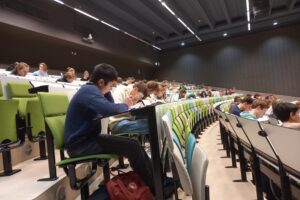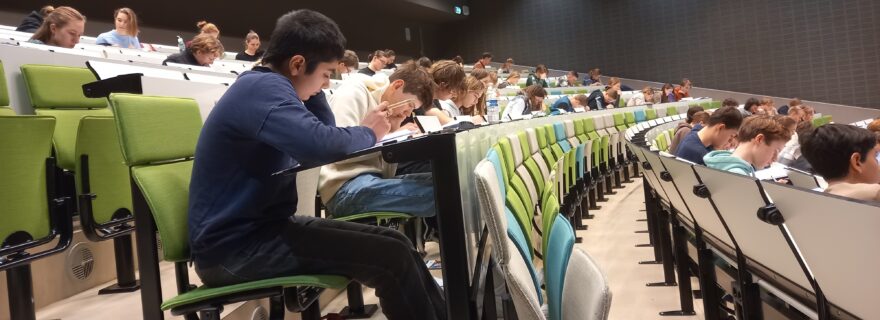2023 Linguistics Olympiad: Who will be this year’s winner?
Tijmen Pronk, organiser of the annual Linguistics Olympiad, writes about the 2023 Linguistic Olympiad competition for high school students in the Netherlands.
For many pupils in their final years of Dutch high school, December, January and February, are the happiest months of the year. This is because during these months they can once again put their problem-solving skills and logical thinking to the test during the annual Linguistics Olympiad (Taalkundeolympiade). This competition is for 15-18-year-old high school pupils from all over the Netherlands who are especially interested in solving puzzles about languages and logic.
This year’s edition started out with an online qualifying round in December 2022. During this round high school participants were asked to solve 4 linguistic puzzles. Those who successfully solved most of the puzzles were then invited to come to Leiden University to take part in the Linguistics Olympiad finals, held on Saturday 28 January.
On the day of the finals, over a hundred of eager teenagers were given 6 linguistic problems to crack. During 2 sessions each lasting 2 hours, pupils were in a state of the utmost concentration, while some of their teachers watched from a distance.

6 challenging problems
During the first session, participants had to solve a problem about the Dhivehi script, a problem about Mari grammar and a problem about the Dutch suffix -ette. After a well-deserved break, they then had to answer questions about the phonetics of Patagonian Welsh and Motuna classifiers and identify mistakes made in computer translations.
The linguistic puzzles that we use in the Olympiad are created by students and former students of our Linguistics programmes at Leiden University. Those students are themselves often former Linguistic Olympiad participants. Each year, the Dutch Language Institute (Instituut voor de Nederlandse taal) also contributes a question to the set of linguistic problems; these questions are of course always about the Dutch language. All puzzles are rigorously tested by a team of our linguistics and PhD-students at the university.
After having handed in their papers, the pupils flooded into the hallway, busily comparing answers and discussing Dutch synonyms and language contact in Latin America.
Who will become 2023 Olympiad champion?
The results of this year’s Linguistics Olympiad will be announced during the Open Day of the University, on 25 February. Not only will the winners gain fame and fortune, but they will also represent the Netherlands during the 2023 International Linguistics Olympiad to be held this Summer in Bansko, Bulgaria.
Can you solve the Mari problem?
Many participants of this year’s competition told us that they found ‘the Mari-problem’ to be the most difficult. It was composed by 2019 Olympiad winner, Martin Lelarge, who is currently a first-year student of the BA Linguistics at Leiden University. Here is an English translation of the problem, so you can try to crack it yourself:
Mari | English |
| 1. akret pörtəštö om oko ma? | A. Does the greybeard go onto the blue mountain? |
| 2. kugəza radiošto ogeš pašaməšte. | B. The small child flies into the red soup. |
| 3. izi okəktəšən kurəkəšto okem ma? | C. Does the teacher sleep in the blue university? |
| 4. izi užava ureməšte kojlana. | D. Do I not read in the old house? |
| 5. joškar sarze olaške ogeš vüdö. | E. Do I read on the mountain of the small teacher? |
| 6. okəktəšo kande vuzəšto malalta ma? | F. The small frog appears on the street. |
| 7. akret küvarəške om vüdö ma? | G. Do I not drive onto the old bridge? |
| 8. kugəza kande kurəkəško pura ma? | H. I sleep in the tasty soup of the frog. |
| 9. izi ige joškar šürəškö čongešta. | I. The greybeard does not work on the radio. |
| 10. užavan tamle šürəštö malaltem. | J. The red soldier does not drive into the city. |
Question 1. Connect each Mari sentence to the correct English translation.
Question 2. What is the difference between the suffixes –(ə)štV and –(ə)škV? The symbol V can stand for any vowel.
Question 3. How do you choose which vowel to fill in for V in the previous question?
Question 4. Translate the following sentences into Mari.
a) I do not sleep on the mountain of the blue frog.
b) Does the small greybeard not go onto the old street of the teacher?
Good luck!


